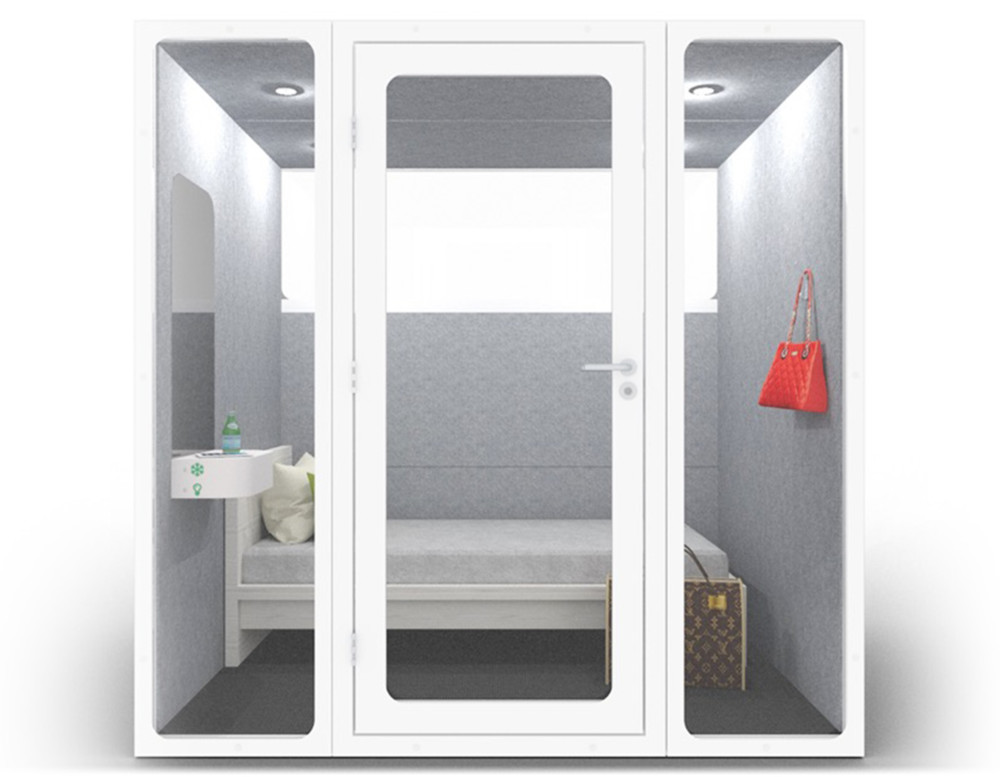By Brittany Meiling
The San Diego Union-Tribune
WWR Article Summary (tl;dr) A San Diego startup manufactures big steel pods sectioned into 43 square-foot bedrooms. Users can find nearby pods, book and pay for beds by the hour for up to four hours.
The San Diego Union-Tribune
A startup in San Diego is capitalizing on tired workers, students and travelers by selling access to “napping pods”, portable steel structures (equipped with cushy beds) that can be rented by the hour through a smartphone.
The company, called Hohm, says beds are in surprisingly short supply in places where people experience exhaustion: busy convention centers, university campuses, major events, airports and large corporate campuses.
“Sleep is just as important as food, it’s a basic human necessity,” said the startup’s founder Nikolas Woods. “But when you need to sleep on the go, what are your options?”
Woods, 26, said beds should be accessible outside of hotel rooms and homes, especially in the age of smartphones.
If we can order Starbucks, rent a scooter, or hail a ride with a smartphone, why can’t we rent a bed?
That’s the problem Hohm is trying to solve. The company manufactures big steel pods sectioned into 43 square-foot bedrooms. Each room is soundproof and private. Inside, the rooms are furnished with a twin bed, a charging station for phones and other devices, and a mirror. Users can find nearby pods, book and pay for beds by the hour for up to four hours, Woods said.
The amenity would be especially convenient at big international airports, where flyers often kill time napping in uncomfortable chairs between connecting flights. But Woods’ vision for the company goes beyond airports.
Woods said he thought of the idea while working long hours at his last venture, a medical supplies company called Lightbox Medical.
His startup was operating out of a coworking space, where Woods was surrounded by entrepreneurs and other tech types who work long hours. Exhaustion, he said, was a common occurrence. It reminded Woods of his days in college, when he and his peers would pull all-nighters at the library and needed a place to rest between classes (reminder: many students do not live in campus dorms).
“I asked myself how often I encountered this problem, and for me it was once or twice a week,” Woods said.
And coworking spaces aren’t the only place napping pods could be of use. It’s a common tale in Silicon Valley for employees of big corporate campuses to be found snoozing in their cars. When employers like Google provide meals, gyms, laundry services and more on campus, there’s not a big incentive to leave. This has pushed some employees to spend months sleeping in the parking lot.
The concept of tiny micro-units, rented by the hour, isn’t brand new. The idea is popular in Tokyo, where “capsule hotels” are a popular alternative to traditional boarding, says Bruce Baltin, managing director of CBRE Hotels.
“This has been done in Japan, and also in some airports,” Baltin said. “Even in the U.S., there’s a trend towards micro hotel units.”
Baltin said millennials and other young consumers are more comfortable with such an idea, and sees these “napping pods” as a reasonable idea.
While the concept of napping pods is intriguing, Hohm still has a long way to go to grow the company. Founded in 2016, Hohm spent the past two years designing and engineering portable steel pods. Their first manufactured pod, delivered in January, weighed in at 1,500 pounds and came in several pieces for assembly onsite. That pod was used as a demo for investors and customers, housed at a warehouse in San Diego.
Just this month, Hohm got its first customer: The University of Arizona. The campus has four pods set up in its student union for students to use. Woods, who was on campus to oversee installation, said interest was high during set up, with curious students popping over to ask when the pods would be ready. The pods are now available for use at the rate of $10-$12 per hour, Woods said.
It should be noted that Hohm is employing one person per pod location to help people check in, clean the rooms, and, most importantly, to “ensure single occupancy,” Woods said.
“We’re excited about this new way to support our students’ well being, especially during finals when sleep is so important for success,” said Neysha Aguilar, a spokesperson for the university. “Hohm sleeping pods will be a great place for students to recharge and keep their minds sharp.”
Woods said he’s raising $850,000 in startup capital to help support growth, and has $200,000 committed so far.
Personally, Woods put $100,000 of his own money into the company to get it off the ground, and $50,000 from an angel investor.














































































































































































































































































































































































